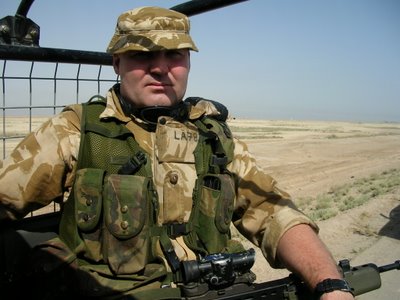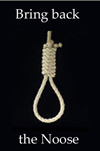Tuesday, May 30, 2006
Our soldiers are being exploited and mistreated by a political leadership unfit to lick their boots By Max Hastings
Yesterday's news that two more British soldiers had been killed in Basra followed another report, that Army desertions have trebled since the Iraq invasion. The desertion figures should shock, but not surprise us.
This is the most unpopular war in living memory that our soldiers have been asked to fight.
Once, a parent might have told an absconding soldier son to get back where he belonged and do his duty.
Today, by contrast, many mothers and fathers are deeply reluctant to see their children risk everything in an apparently thankless cause — a reality also reflected in poor Army recruiting figures.
The absolute number of 'permanent absent without leave' cases — AWOLs — is not disastrous: 377 last year, in an Army of 100,000.
Most of our soldiers fulfil their orders with the same loyalty, dedication and professionalism they have always shown.
But the figures reflect a malaise that goes much deeper, and should alarm everyone who cares about our Armed Forces. These have been cut to the bone by a Government which insists that they do far too much with far too little.
The truth is that the 'can do' spirit on which British commanders have always prided themselves is being abused by ministers in the most cynical fashion.
When John Reid was still Defence Secretary, he issued draconian instructions that no officer should publicly discuss the Army's new mission in Afghanistan, where 13 people were killed yesterday during a riot in the capital, Kabul.
This was because he knew that most soldiers regard Britain's Afghan commitment, with 3,000 of our troops spearheading a Nato force of 14,000, as gesture strategy of the worst sort.
Credible
The British contingent is being deployed in Helmand province, an area the size of Scotland, with no credible plan, and no coherent chain of command beyond a battery of international committees.
Their task is to support the Afghan reconstruction process, a commendable objective, if there were 20 times the number of men to do it.
The British contribution is restricted by our desperate shortage of helicopters, a scandal in its own right.
The other Nato contingents will be prevented by their own governments from acting offensively against Taliban insurgents, or even from firing their weapons except in mortal peril.
The British will be able to train some Afghan soldiers, but if they attack the huge local heroin industry, no one doubts that the local people there will respond violently.
In other words, Nato troops are being deployed on an ill-defined mission with wildly inadequate resources, so that the British Government can pretend that we are 'doing our bit'.
A distinguished retired officer told me yesterday: 'This is a Mission Impossible, and it seems quite wrong to commit our troops on such terms.'
The Afghan deployment — which does not formally start for another month — is, of course, overlaid on the strain of British operations in Iraq.
Units are being rotated into combat so frequently that not only are soldiers' domestic lives uprooted, but their training is also being chronically dislocated.
Intensive training is vital, even when soldiers are getting battle experience. Yet cash constraints have caused all training to be slashed, except for units on the brink of deployment.
Most of the Army's equipment is still good, but delays in ordering a new infantry armoured vehicle represent another scandal.
The armoured Land Rover is not remotely adequate for patrolling in areas where insurgents are using landmines — as they did yesterday for the killings in Basra. Yet until a new vehicle is provided, our soldiers will continue to be blown up in Land Rovers.
The threat of legal action against men who make mistakes in action also casts a much longer shadow than senior officers admit.
Even in elite units, there are authoritative reports of soldiers proving reluctant to pull the trigger because of the lurking lawyers.
Unit colonels, whose word was once law among those they led, know that on the battlefield they must keep one eye over their shoulder, watching the hunting pack of civilian officials and special investigators who dog the heels of the fighting men.
The reputation of Lord Goldsmith, the Attorney-General, was destroyed by his change of heart to accommodate Tony Blair about the legality of invading Iraq in 2003.
Yet Goldsmith's sticky fingers continue to meddle in Army combat operations. The string of soldiers' trials for which he is responsible — even though most have eventually been abandoned — has done much harm.
Intelligence, the vital tool of counter-insurgency, is in a poor state.
Tony Blair appointed John Scarlett, the intelligence officer most intimately implicated with him in the 2003 weapons of mass destruction scandal, as director of the Secret Intelligence Service.
Scarlett's performance commands no more confidence now than it did then, but Alastair Campbell's 'mate' merely observes complacently: 'There have been no complaints from the Ministry of Defence' about MI6' s work. There certainly should be.
Betrayal
It is a fine mess, reflecting a historic betrayal by Tony Blair and Gordon Brown. For several generations, Britain has possessed the finest armed forces of their size in the world. Now, increasingly, they are falling prey to the diseases which afflict their European counterparts.
Short of resources and overstretched, in operational areas units are encouraged to act cautiously, to restrict casualties and the political embarrassment they cause.
A senior soldier says: 'The British Army is rightly proud of its offensive spirit, but this is being knocked out of it.
We are now very much poor relations of the Americans, who are allowed to go after insurgents much more aggressively, because our politicians don't want trouble.'
Not long ago, I attended a dinner at which an American guest described how his son, a young officer serving with the U.S. Army in Iraq, received countless letters and parcels sent to him — as to every American combat soldier — from unknown well-wishers back in the U.S.
'Does the same happen to your men?' my friend asked a British officer beside him.
'No, it does not,' came the bitter response. 'This is a very unpopular war.'
Monstrous
In this matter, the American people are behaving better than the British.
It is no fault of our fighting men that they have fallen victim to the monstrous misjudgments of their government. They are as splendid as they always were, and deserve our unstinting admiration, affection and support.
But we should not fool ourselves that they are happy in their work. They are being exploited and mistreated by a political leadership which does not deserve them.
Iraq has become a familiar story of woe, and Afghanistan represents a nonsense that could become a tragedy.
'This Government is presiding over grave damage to the British Army,' says a former chief of staff who is not given to exaggeration.
Our soldiers are forbidden to show their anger and resentment. It is up to us to do this for them.
This is the most unpopular war in living memory that our soldiers have been asked to fight.
Once, a parent might have told an absconding soldier son to get back where he belonged and do his duty.
Today, by contrast, many mothers and fathers are deeply reluctant to see their children risk everything in an apparently thankless cause — a reality also reflected in poor Army recruiting figures.
The absolute number of 'permanent absent without leave' cases — AWOLs — is not disastrous: 377 last year, in an Army of 100,000.
Most of our soldiers fulfil their orders with the same loyalty, dedication and professionalism they have always shown.
But the figures reflect a malaise that goes much deeper, and should alarm everyone who cares about our Armed Forces. These have been cut to the bone by a Government which insists that they do far too much with far too little.
The truth is that the 'can do' spirit on which British commanders have always prided themselves is being abused by ministers in the most cynical fashion.
When John Reid was still Defence Secretary, he issued draconian instructions that no officer should publicly discuss the Army's new mission in Afghanistan, where 13 people were killed yesterday during a riot in the capital, Kabul.
This was because he knew that most soldiers regard Britain's Afghan commitment, with 3,000 of our troops spearheading a Nato force of 14,000, as gesture strategy of the worst sort.
Credible
The British contingent is being deployed in Helmand province, an area the size of Scotland, with no credible plan, and no coherent chain of command beyond a battery of international committees.
Their task is to support the Afghan reconstruction process, a commendable objective, if there were 20 times the number of men to do it.
The British contribution is restricted by our desperate shortage of helicopters, a scandal in its own right.
The other Nato contingents will be prevented by their own governments from acting offensively against Taliban insurgents, or even from firing their weapons except in mortal peril.
The British will be able to train some Afghan soldiers, but if they attack the huge local heroin industry, no one doubts that the local people there will respond violently.
In other words, Nato troops are being deployed on an ill-defined mission with wildly inadequate resources, so that the British Government can pretend that we are 'doing our bit'.
A distinguished retired officer told me yesterday: 'This is a Mission Impossible, and it seems quite wrong to commit our troops on such terms.'
The Afghan deployment — which does not formally start for another month — is, of course, overlaid on the strain of British operations in Iraq.
Units are being rotated into combat so frequently that not only are soldiers' domestic lives uprooted, but their training is also being chronically dislocated.
Intensive training is vital, even when soldiers are getting battle experience. Yet cash constraints have caused all training to be slashed, except for units on the brink of deployment.
Most of the Army's equipment is still good, but delays in ordering a new infantry armoured vehicle represent another scandal.
The armoured Land Rover is not remotely adequate for patrolling in areas where insurgents are using landmines — as they did yesterday for the killings in Basra. Yet until a new vehicle is provided, our soldiers will continue to be blown up in Land Rovers.
The threat of legal action against men who make mistakes in action also casts a much longer shadow than senior officers admit.
Even in elite units, there are authoritative reports of soldiers proving reluctant to pull the trigger because of the lurking lawyers.
Unit colonels, whose word was once law among those they led, know that on the battlefield they must keep one eye over their shoulder, watching the hunting pack of civilian officials and special investigators who dog the heels of the fighting men.
The reputation of Lord Goldsmith, the Attorney-General, was destroyed by his change of heart to accommodate Tony Blair about the legality of invading Iraq in 2003.
Yet Goldsmith's sticky fingers continue to meddle in Army combat operations. The string of soldiers' trials for which he is responsible — even though most have eventually been abandoned — has done much harm.
Intelligence, the vital tool of counter-insurgency, is in a poor state.
Tony Blair appointed John Scarlett, the intelligence officer most intimately implicated with him in the 2003 weapons of mass destruction scandal, as director of the Secret Intelligence Service.
Scarlett's performance commands no more confidence now than it did then, but Alastair Campbell's 'mate' merely observes complacently: 'There have been no complaints from the Ministry of Defence' about MI6' s work. There certainly should be.
Betrayal
It is a fine mess, reflecting a historic betrayal by Tony Blair and Gordon Brown. For several generations, Britain has possessed the finest armed forces of their size in the world. Now, increasingly, they are falling prey to the diseases which afflict their European counterparts.
Short of resources and overstretched, in operational areas units are encouraged to act cautiously, to restrict casualties and the political embarrassment they cause.
A senior soldier says: 'The British Army is rightly proud of its offensive spirit, but this is being knocked out of it.
We are now very much poor relations of the Americans, who are allowed to go after insurgents much more aggressively, because our politicians don't want trouble.'
Not long ago, I attended a dinner at which an American guest described how his son, a young officer serving with the U.S. Army in Iraq, received countless letters and parcels sent to him — as to every American combat soldier — from unknown well-wishers back in the U.S.
'Does the same happen to your men?' my friend asked a British officer beside him.
'No, it does not,' came the bitter response. 'This is a very unpopular war.'
Monstrous
In this matter, the American people are behaving better than the British.
It is no fault of our fighting men that they have fallen victim to the monstrous misjudgments of their government. They are as splendid as they always were, and deserve our unstinting admiration, affection and support.
But we should not fool ourselves that they are happy in their work. They are being exploited and mistreated by a political leadership which does not deserve them.
Iraq has become a familiar story of woe, and Afghanistan represents a nonsense that could become a tragedy.
'This Government is presiding over grave damage to the British Army,' says a former chief of staff who is not given to exaggeration.
Our soldiers are forbidden to show their anger and resentment. It is up to us to do this for them.




























